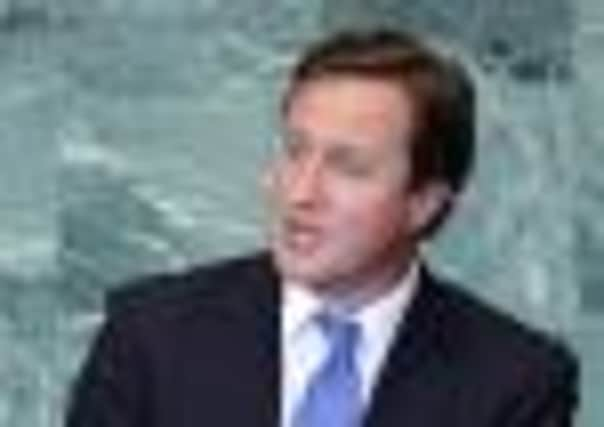‘UN must unite in action against the oppressors’


In a strong defence of interventionism, the Prime Minister said the Arab Spring uprisings and conflict in Libya demonstrated that the UN needed “a new way of working”.
“To fail to act is to fail those who need our help,” he told world leaders at the United Nations General Assembly in New York.
Advertisement
Hide AdAdvertisement
Hide AdMr Cameron said the popular uprisings in North Africa and the Middle East had provided “a massive opportunity to spread peace, prosperity, democracy and vitally security” – but only if nations seized it.
“The UN has to show that we can be not just united in condemnation, but united in action, acting in a way that lives up to the UN’s founding principles and meets the needs of the people,” he said.
“You can sign every human rights declaration in the world, but if you stand by and watch people being slaughtered in their own country, when you could act, then what are those signatures really worth?”
The Prime Minister said the international community needed to use a combination of military action or “hard power” and “soft power” like diplomacy and financial aid.
He argued that the people of the Arab world had made clear their aspirations for greater freedom, more accountable governments and an end to corruption.
“As people in North Africa and the Middle East stand up and give voice to their hopes for more open and democratic societies, we have an opportunity – and I would say a responsibility – to help them,” he said.
Mr Cameron said: “Here at the UN, we have a responsibility to stand up against regimes that persecute their people.”
The Prime Minister singled out Yemen and Syria as being in need of reform.
Advertisement
Hide AdAdvertisement
Hide Ad“It is time for the members of the Sec-urity Council to act,” Mr Cameron said in reference to the repressive regime in Damascus.
The Prime Minister acknowledged that care had to be taken when delving into the internal affairs of a sovereign state, but insisted that should not be “an excuse for indifference in the face of a regime that week after week arrests, intimidates, tortures and kills people who are peacefully trying to make their voices heard”.
Mr Cameron also told UN delegates that Palestinians had a right to a “viable state of their own” and that the international community should help them achieve this.
The UK is still weighing its response to an expected Palestinian push for statehood later this week.
But Mr Cameron said that no resolution could provide the “political will” needed for lasting peace and called on both Israel and the Palestinians to return to the negotiating table for direct talks.
Asked later whether he was blocking progress towards a Palestinian state, Mr Cameron said: “I am campaigning for Palestinian statehood. I want to help make it happen.”
But he added: “We will only support measures and processes if they actually help to get these talks back on track.
“I’m a practical person, I don’t believe in lofty declarations. I believe in rolling up sleeves to get things done.”
Advertisement
Hide AdAdvertisement
Hide AdLiberal Democrat MP Sir Menzies Campbell, a member of the Commons foreign affairs committee, said: “The Prime Minister is well entitled to take credit for the successful action in Libya but when considering the principle of intervention in the future it should be borne in mind that in relation to Libya the circumstances pointed strongly towards the legitimacy of military action.
“The endorsement of the Arab League and the African Union, the imminence of the threat to the lives of the people of Benghazi and the legal authority provided by UN Resolution 1973 were all vital. In other circumstances it may be very difficult to create a similar favourable environment.”
Ahead of his speech to the UN, the Prime Minister held talks with UN Secretary-General Ban Ki-moon.
Mr Ban welcomed Mr Cameron to his first general assembly – the Prime Minister missed last year’s gathering, which took place shortly after the birth of his fourth child, Florence.
Mr Cameron said he had been given a “pass” to attend this year’s event.
UK delegates walked out of Iranian president Mahmoud Ahmadinejad’s speech at the UN.
In what has now become something of an annual tradition, the two low-level British officials joined other European nations and the United States in the symbolic and widely expected protest.